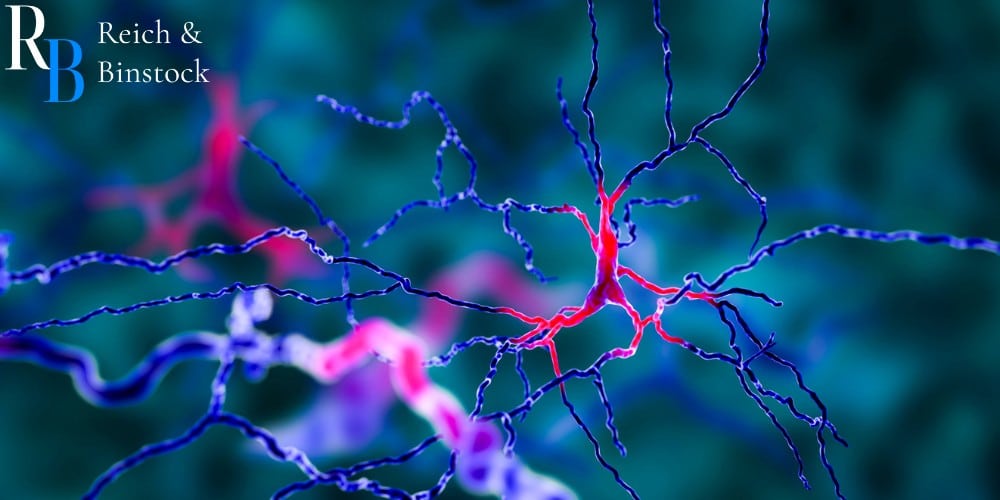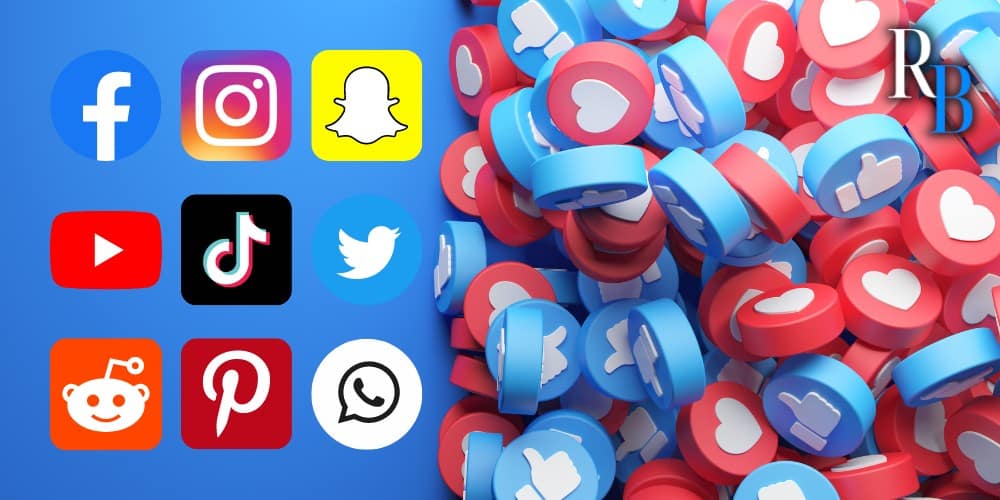SOCIAL MEDIA ADDICTION LAWSUIT
PRACTICE AREAS
Table of Contents
Social media platforms such as Facebook, Instagram, and TikTok have increasingly come under fire for allegations that claim they knew about the addictive properties of their apps. What’s more, is that recent lawsuits claim that these social networking sites intentionally designed their algorithms to encourage excessive social media use by young people. Social media addiction is one of the most pressing issues that children and teens face today.
The mass tort lawyers at Reich & Binstock are here to represent the parents of children and teens who have suffered harm as a result of their social media overuse. Excessive social media usage has been linked to certain mental and physical health effects. Examples include social anxiety disorder, self-destructive behaviors, psychological dependency, depression, low self-esteem, self-harm, and even suicide. Parents and young adults have the right to seek compensation for the harm caused by negligent social media apps.
To schedule your free consultation with one of the premier law firms handling social media addiction lawsuits, please contact Reich & Binstock today.
What Is Social Media Addiction?
After the initial boom of social media platforms like Facebook, Instagram, Snapchat, Twitter, and others, social media has become increasingly popular in recent years. Although most users don’t experience addiction or other negative side effects, anywhere from 5 to 10% of Americans are considered addicted to social media, according to social media addiction statistics.
Social media addiction is a behavioral addiction, which means that, rather than being addicted to a substance like drugs or alcohol, one becomes addicted to certain actions. Other examples of behavioral addictions include gambling, pornography, shopping, and even plastic surgery. According to the Addiction Center, social media addiction is characterized as “being overly concerned about social media, driven by an uncontrollable urge to log on to or use social media.”
Frequent social media usage does not automatically equal or lead to social media addiction. However, when devoting so much time and energy to social media begins to affect one’s life and social relationships, this is considered addiction. Over time, one’s increasing dependence on social media can lead to negative consequences, such as ignoring real-life relationships, mental health problems, and much more.
Why Is Social Media Addictive?

So, why is social media addictive for some people? Social media affects the brain in a very interesting way. It can lead to both physical and psychological addiction due to its effect on the brain’s reward centers. These reward areas have a profound effect on one’s decisions and emotions. When people use drugs, drink alcohol, or do something rewarding, their dopamine levels rise. This happens when social network users receive messages, “likes”, or post mentions.
The brain considers this rush of dopamine to be a reward, and thus associates social media use with positive emotions and reinforcement. The dopamine reward system basically goes haywire and doles out endless rewards in the form of online interactions for very little effort from the user. Over time, the brain literally rewires its reward system to lead a person to desire and seek out social media interactions.
Problematic social media use also arises when people look to their social media accounts for stress relief or to help with their depression and loneliness. Social media platforms provide continuous rewards for people who don’t receive them in their daily lives. Therefore, this leads to increased social media engagement, mental health problems, physical health problems, and a strong psychological dependence on social media use.
How Many Hours on Social Media Is Considered an Addiction?
The average person spends as long as two hours on Facebook, Instagram, and other social media platforms. The average teenager, however, can spend as many as five hours a day on social media sites. Spending at least 5 hours a day on these sites can qualify as social media addiction. However, teens who are addicted tend to spend as many as 9 hours a day scrolling through social media. This is a staggering amount of time, as the average person is awake for around 14-16 hours a day.
The more time a person spends on social media in a day, the longer they are exposed to negative social media influences and constant streams of dopamine. The Journal of Social and Clinical Psychology recommends that restricting one’s use of social media to just 30 minutes a day can be better for one’s mental and physical health.
What Are the Signs of Social Media Addiction?

If you’re a parent of a child who spends a lot of time on social media, you may wonder what the signs of addiction look like. Many people use social media on a regular basis, but only a small percentage of these people are truly addicted. If your child or teen exhibits the following symptoms, they may be addicted to social media.
- Frequently trying to reduce their social media intake, but failing
- Spending an excessive amount of time thinking about social media or planning to use it
- Feeling the urge to increase their use of social media
- Using social networking sites so often that it affects their real-life relationships, their academic performance, or their job performance
- Becoming restless or upset if they cannot access a social media site
- Using social media as a coping mechanism or to forget about personal problems
Having one of these symptoms may be troubling, but it may not automatically indicate an addiction. However, exhibiting multiple of the above symptoms may indicate the presence of a social media addiction.
How Social Media Affects Teens
Studies have shown that social media and Internet addiction has been linked to an increased risk of mental health problems. In fact, this kind of addiction can cause some of the same problems that substance abuse causes. Excessive social media use could lead to the following negative effects.
- Poor academic performance
- Repeat self-destructive behaviors
- False social comparison
- Disruption of sleep
- Distraction
- Exposure to bullying
- Rumor spreading
- Developing an unrealistic view of others
- Exposure to peer pressure
- Exposure to inappropriate or traumatic content
- Access to inaccurate information
- Lowered critical thinking skills
- Exposure to predators
- Impostor syndrome
Social media platforms pair positive reinforcement with constant dopamine release, leading teens and young adults to suffer the consequences of online social networking. As a parent of an affected teen, or as someone who has been negatively affected by social media, you deserve compensation.
How Social Media Affects Children
Social media use has even begun to spread to and affect children as early as 7 years old. This is a critical stage of development for children, as they have begun to learn about interpersonal communication, understand current events, and much more. Social media can hinder the development of children in a number of ways, including the following.
- Not getting enough sleep
- Neglecting school responsibilities
- Increased risk of obesity
- Learning impairments
- Delays in social skills
- Behavioral problems, such as irritability
- Increased instances of risky behaviors
- Loss of personal privacy
- Exposure to predators and stalking
- Early exposure to inappropriate or sexual content
- Cyberbullying and harassment
Young children can and do suffer from Instagram, Snapchat, TikTok, and Facebook addiction. Our attorneys are here to hold social media platforms accountable for the harm they cause.
How Does Social Media Addiction Happen?

Social media addiction is a particularly high risk in children and teenagers, but why? How does this addiction happen and why is it so damaging? Teenagers are in the stage of growth known as adolescence. Their brains and social skills develop rapidly, as can their addictions. Social media and smartphone addiction causes teenagers to constantly seek out the immediate rush of dopamine that social media provides. This rewiring of the brain can even lead to compulsive, obsessive, and addictive behavior. These negative behaviors then lead to worsening of mental health problems, such as depression, anxiety, ADHD, and even body dysmorphia.
How Does Social Media Harm Teens and Children?
When children and teenagers use social media and mobile phones from an early age, they are more at risk of developing harmful disorders and future behaviors that are addictive. Children can grow up with more anxiety, lower self-esteem, and difficulty communicating with their peers.
Real-life interactions are crucial for nonverbal communication, as they teach people about social cues, facial expressions, body language, and vocal fluctuations. Texting and communicating online takes these nonverbal cues out of the equation.
Mental Health Effects of Social Media Addiction
The mental health effects of social media are particularly startling. Several studies have established a significant link between heavy use of social media and an increased risk of developing the following mental disorders.
- Anxiety
- Depression
- Loneliness
- Self-harm
- Suicidal thoughts
- Insecurity
- Isolation
- Self-absorption
As these conditions and symptoms worsen from the use of social media, teens and children tend to delve even more deeply into the very thing causing their problems. The symptoms worsen, which leads to an increased use of social media, which then continues to make the symptoms worse. It is a vicious cycle that many social network users repeat without even realizing it.
What Is Cyberbullying?
Cyberbullying refers to the use of electronic communication platforms, such as social media, to harass, intimidate, or harm individuals. It involves the deliberate and repeated use of digital technology to spread false information, threats, or hurtful messages with the intention of causing emotional distress or harm to the target.
Types of Cyberbullying
Cyberbullying can take various forms, including spreading rumors, sending abusive messages, sharing private information, or creating and circulating harmful content online. It poses serious consequences for the well-being of individuals, often leading to psychological and emotional distress. Some of the most common forms of cyberbullying include doxxing, catfishing, exclusion, harassment, cyberstalking, outing, impersonation, trolling, dissing, and denigration.
Doxxing
Doxxing, short for “document dropping,” is a malicious online practice where individuals’ private and sensitive information, such as addresses, phone numbers, or financial details, is publicly disclosed without their consent.
Perpetrators often obtain this information through thorough online research, hacking, or exploiting vulnerabilities. Doxxing is frequently used as a form of harassment, retaliation, or to incite harm, and it can have serious consequences for the victims, including privacy invasion, stalking, or identity theft.
Catfishing
Catfishing is a deceptive online activity where an individual creates a fake identity or persona, often using fake photos and information, to establish a relationship with someone else on the internet. The term originated from the idea of using catfish to “fish” for unsuspecting victims. Catfishers typically engage in online interactions, such as on social media or dating platforms, with the intention of deceiving others about their true identity and motives.
The motives behind catfishing vary and may include seeking emotional connections, manipulating others, or perpetrating scams. Victims of catfishing may experience emotional distress and betrayal upon discovering the deception.
Exclusion
Exclusion involves intentionally leaving others out of online spaces as a form of bullying. This can result in the victim feeling isolated, experiencing FOMO, and possibly depression.
Harassment
Harassment occurs when someone sends persistent and harmful messages to victims. These actions are repeated, and can contain threats as well as harmful language.
Cyberstalking
Cyberstalking is a form of harassment where an individual uses digital platforms, such as social media, to repeatedly and obsessively pursue, monitor, or intimidate another person.
This behavior often involves unwanted and intrusive actions, such as sending threatening messages, spreading false information, or tracking the victim’s online activities. Cyberstalkers may exploit various online tools to gather personal information about their targets and use it to cause emotional distress or harm.
Outing
To out someone on social media means to reveal a person’s gender identity or sexual orientation without their consent. This is done with the intent to harm the victim through creating strife in their personal life.
Fraping and Impersonation
Cyberbullies sometimes impersonate victims online and post inappropriate or harmful content through their social media profiles. When this happens, a victim could face backlash for the content they never posted themselves.
Trolling
Trolling is not always considered a form of cyberbullying. However, if trolling involves posting negative or harmful comments about the victim online, this is considered cyberbullying.
Dissing and Flaming
Dissing and flaming are two sides of the same coin. While dissing involves making comments about the victim to others behind their back, flaming involves making these comments directly to the victim. These actions can be done with the goal of harming the victim’s reputation or goading them into an online argument.
Who Can File a Social Media Addiction Lawsuit?
So, who actually qualifies to seek compensation in a social media addiction lawsuit? You might qualify for a lawsuit if you meet or your child meets the following criteria.
- You or your child may be addicted to social media use. Examples of social media platforms include Facebook, Instagram, Snapchat, TikTok, and Twitter.
- You or your child suffered mental or physical harm as a result of social media addiction.
- You or your child was under 25 years of age when the addiction began.
If you’re unsure of whether or not you qualify for a claim, please contact our law office as soon as possible for your free consultation. Fill out our online intake form today.
Is There a Class Action Lawsuit Against Social Media Platforms?
As of January 2nd, 2023, the Judicial Panel for Multidistrict Litigation has determined that all pending cases involving teenage social media addiction will be consolidated into a class action MDL. The MDL will take place in the Northern District of California, and it will consolidate around 80 separate cases that are pending in federal courts. These individual cases allege that the defendant social media platforms are addictive in a harmful way, which leads teens to harm themselves.
Although there are multiple defendants in these cases, approximately 70% of them are against Meta, which is the social technology company responsible for Facebook and Instagram.
Facebook Lawsuit
As of October 2023, 41 states and Washington D.C. have sued Meta, alleging that their social media platforms encourage addiction and can cause physical and psychological harm to children. Facebook is the largest social media platform in the world, with over 3 billion monthly users. This is not the first time Meta has been investigated for its alleged contributions to mental health issues in young people.
Instagram Lawsuit
Because Facebook and Instagram are both owned by Meta, they both face allegations of causing harm to children and teenagers. The lawsuits allege that both Facebook and Instagram have purposefully addictive algorithms to profit off of young people and their insecurities. Contact Reich & Binstock to file an Instagram lawsuit.
Snapchat Lawsuit
Addiction isn’t the only problem that young users have faced on social media platforms. In a recent lawsuit filed in October 2022, over 60 family members of children alleged that Snapchat contributed to illegal drug sales taking place on their platform.
In all but two cases mentioned in the lawsuit, the children died after taking drugs they allegedly obtained from someone they met on Snapchat. In January 2024, a California judge ruled that the lawsuit was substantial enough to continue to trial. This is a significant victory for the families of the young victims.
Tiktok Lawsuit
Tiktok has not been immune to ongoing social media lawsuits. In October 2023, the state of Utah filed a lawsuit against Tiktok. The lawsuit alleges that the social media platform promotes addictive and unhealthy use of the platform and misrepresents the safety of the app.
How to Break a Social Media Addiction
Breaking a social media addiction involves implementing intentional strategies to reduce usage and regain control over one’s online habits. Firstly, setting specific, achievable goals for social media use can be helpful, such as designating specific time slots or limiting the duration spent on these platforms.
Turning off notifications and creating designated tech-free zones or times can also create boundaries. Additionally, finding alternative activities, such as pursuing hobbies, exercising, or spending more time with friends and family, can help replace the habit of constantly checking social media.
Seeking support from friends or joining online communities focused on digital well-being can provide encouragement and accountability. Lastly, considering a dopamine detox, digital detox periods, or using apps that track and limit screen time can contribute to breaking the cycle of social media addiction.
If you or someone you love has suffered harm from social media addiction, contact Reich & Binstock to get started on your social media addiction claim.
How to File a Social Media Addiction Lawsuit
First, you’ll need to determine whether or not you qualify for a social media addiction lawsuit. You can do this by contacting the attorneys at Reich & Binstock for a free consultation. Our social media addiction lawyers will investigate the facts of your case and handle the entire legal process on your behalf. This way, you can have more time to focus on both yourself and your family during this stressful time.
Once we verify that you qualify for a social media claim, we will begin gathering evidence to support this claim. We’ll build as strong a case as we possibly can, all while supporting you and your family throughout the process. We will file the lawsuit on your behalf, ensuring that we meet all necessary deadlines and legal guidelines.
Once we take your case to court, we are prepared to either pursue settlement negotiations, or we can go to trial. We have nationally recognized trial lawyers who are fully prepared to advocate on your behalf in front of a judge and jury if necessary.
Who Can I Sue for Social Media Addiction?

It’s important to understand who the potential defendants are in these cases. In general, victims should be able to pursue compensation from the social media companies that are responsible for these negative effects. Many ongoing lawsuits allege that these companies intentionally format and develop their algorithms to encourage users to spend more time on these platforms. Therefore, if you or your child has suffered harm as a result of social media addiction, you may have a strong case.
What Are the Potential Settlement Values of Social Media Addiction Lawsuits?
This is a difficult question to answer, as these cases are still in the early stages of litigation. However, if you receive compensation in your case, it will likely be in the form of either a settlement or a trial verdict. Large MDL cases could take years to litigate, and even longer for victims to begin seeing payouts. For a better idea of how much your case might be worth, we recommend speaking with a social media addiction lawyer at Reich & Binstock.
Has Your Child Suffered Harm from Social Media Addiction?

Large social media companies cannot be allowed to continue contributing to addiction and harmful behaviors in children, teens, and young adults. These are among the most vulnerable age groups in the general population. Therefore, unsafe products that promote harmful behaviors and addiction should be held accountable.
The personal injury team at Reich & Binstock stands ready to help you take your case to court and fight for justice on behalf of you and your family. We are proud to push back against big companies like Meta, (Facebook, Instagram), ByteDance (TikTok), and Snap (Snapchat). When you work with our attorneys, you’ll receive the following benefits.
- Our years of experience holding large companies accountable for harmful products, deceptive advertising, unfair practices, and the harm they cause
- The potential to help bring awareness to social media addiction, as well as preventing future youth from suffering these harms
- Pursue and secure compensation to cover the costs of professional treatment for mental health problems caused by social media addiction
- Fighting for justice on behalf of yourself and your family against predatory social media companies
Contact Reich & Binstock to File a Social Media Addiction Lawsuit
At Reich & Binstock, we recognize that, while social media does have many benefits, it can be extremely harmful to children and teens. Even young adults can suffer from excessive social media use. If you are a parent of a child who has been harmed by social media, or if you are an adult who has been harmed by social media, you deserve compensation for that harm.
Social media companies must be held accountable for encouraging addiction and harming teens and children. To schedule a free consultation about filing a social media lawsuit, please contact the Houston personal injury attorneys at Reich & Binstock by completing the online form today. You can also call our office at 713-622-7271.
There is a never a fee unless we recover on your behalf.












